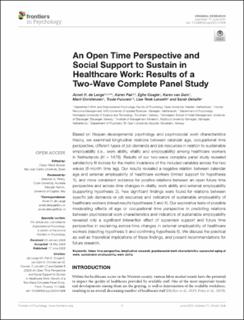| dc.contributor.author | de Lange, Annet H. | |
| dc.contributor.author | Pak, Karen | |
| dc.contributor.author | Osagie, Eghe | |
| dc.contributor.author | van Dam, Karen | |
| dc.contributor.author | Christensen, Marit | |
| dc.contributor.author | Furunes, Trude | |
| dc.contributor.author | Løvseth, Lise T | |
| dc.contributor.author | Detaille, Sarah | |
| dc.date.accessioned | 2020-08-20T07:47:48Z | |
| dc.date.available | 2020-08-20T07:47:48Z | |
| dc.date.created | 2020-08-12T11:17:53Z | |
| dc.date.issued | 2020 | |
| dc.identifier.citation | Frontiers in Psychology. 2020, 11 (1308), | en_US |
| dc.identifier.issn | 1664-1078 | |
| dc.identifier.uri | https://hdl.handle.net/11250/2673101 | |
| dc.description.abstract | Based on lifespan developmental psychology and psychosocial work characteristics theory, we examined longitudinal relations between calendar age, occupational time perspective, different types of job demands and job resources in relation to sustainable employability (i.e., work ability, vitality and employability) among healthcare workers in Netherlands (N = 1478). Results of our two-wave complete panel study revealed satisfactory fit indices for the metric invariance of the included variables across the two waves (6-month time lag). Our results revealed a negative relation between calendar age and external employability of healthcare workers (limited support for hypothesis 1), and more consistent evidence for positive relations between an open future time perspective and across-time changes in vitality, work ability and external employability (supporting hypothesis 2). Few significant findings were found for relations between specific job demands or job resources and indicators of sustainable employability of healthcare workers (mixed results hypotheses 3 and 4). Our explorative tests of possible moderating effects of age or occupational time perspective in predicting relations between psychosocial work characteristics and indicators of sustainable employability revealed only a significant interaction effect of supervisor support and future time perspective in explaining across-time changes in external employability of healthcare workers (rejecting hypothesis 5 and confirming hypothesis 6). We discuss the practical as well as theoretical implications of these findings, and present recommendations for future research. | en_US |
| dc.language.iso | eng | en_US |
| dc.publisher | Frontiers Media | en_US |
| dc.rights | Navngivelse 4.0 Internasjonal | * |
| dc.rights.uri | http://creativecommons.org/licenses/by/4.0/deed.no | * |
| dc.title | An Open Time Perspective and Social Support to Sustain in Healthcare Work: Results of a Two-Wave Complete Panel Study | en_US |
| dc.type | Peer reviewed | en_US |
| dc.type | Journal article | en_US |
| dc.description.version | publishedVersion | en_US |
| dc.source.volume | 11 | en_US |
| dc.source.journal | Frontiers in Psychology | en_US |
| dc.source.issue | 1308 | en_US |
| dc.identifier.doi | 10.3389/fpsyg.2020.01308 | |
| dc.identifier.cristin | 1822945 | |
| dc.description.localcode | Copyright © 2020 de Lange, Pak, Osagie, van Dam, Christensen, Furunes, Løvseth and Detaille. This is an open-access article distributed under the terms of the Creative Commons Attribution License (CC BY). The use, distribution or reproduction in other forums is permitted, provided the original author(s) and the copyright owner(s) are credited and that the original publication in this journal is cited, in accordance with accepted academic practice. No use, distribution or reproduction is permitted which does not comply with these terms. | en_US |
| cristin.ispublished | true | |
| cristin.fulltext | original | |
| cristin.qualitycode | 2 | |

